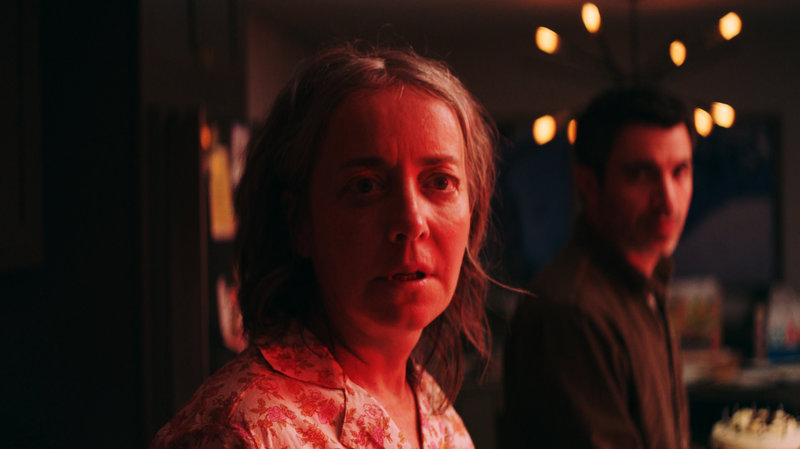What is Not Promised, by Reed Lackey
7 Aug

Bursting with unbridled creative boldness and fearlessly focused on the haunting questions it raises, She Dies Tomorrow – the new film by writer/director Amy Seimetz – is a film that will likely polarize audiences, confusing and frustrating some while inspiring and captivating others. It is a unique vision of anxiety and courage, carried almost exclusively by subtext and mood. It is somehow simultaneously as intimate as a shared secret and as relatable as a timeless myth. And it is entirely possible that when you finish it, you won’t quite know how to feel: which is a testament to its power.
Amy (played with subtle perfection by Kate Lyn Sheil) awakens one morning and steps into the bright sunshine outside her door. Nearly immediately, she knows that she’s going to die tomorrow. We don’t know how she knows this or why, but she is certain. Every choice, every idle moment that follows, is then subject to the aftershocks of this revelation. This is perhaps best illustrated by her retort to her friend Jane, who compels her to relax and “watch a movie.” Amy replies coldly, “A movie is 90 minutes.”
But there is a quality to Amy’s condition which is already beyond her control. The moment she verbalizes her certainty of death, her conviction becomes a contagion. She tells her friend Jane, who soon becomes overwhelmed by the same certainty. Jane then tells others, who now will not be able to escape the same haunting considerations. The film never wanders into apocalyptic extremism, and thank goodness for that because what we have is immensely more uncomfortable and more interesting. The characters sit in their fatal assurances, in extended moments of stillness and quiet, and try to wrestle down what it all means, despite the futility of such an exercise.
There is an absolute glut of stories, both long and short, which have dealt with individuals facing imminent death. Most of them embrace a saccharine preciousness to the dwindling hours our characters have left, usually leading them right up to an epiphany of joyous appreciation for their shortened life before wrapping it all in an “everything’s ok now” bow. Seimetz bravely rejects such easy platitudes and chooses instead to embrace the far more human uncertainty and lingering confusion such a catastrophe might cause. She even subverts those very tropes in the film’s powerful final moments, giving literal lip service to the sentiment of “everything is fine” when we all know too well that reality is way too complicated to be so tritely dismissed.
Because despite our fondest hopes that we might be capable of “living each day to the fullest – as if it were our last,” the stark reality is that most of us have very little clue what to do with ourselves when faced with our own mortality. We would love to be the people with the bucket list of wishes fulfilled, when we likely already know that our ultimate ends will be far more boringly ordinary. So we freeze at the thought of it, or we binge on our pleasures, or we ponder our unfinished business piece by piece. We argue, we laugh, we lounge, or we wander. We play the same record over and over and over because it’s easier than the pressure of trying to decide what our final playlist will actually be. These are the responses Seimetz’s various characters display, making the film feel uncomfortably relevant even as very little of what might be described as “plot” ever actually takes place.
This commitment to evocation over explanation is liable to send a subset of the audience scratching their heads or scoffing at the intent, but this singularity of vision is among the film’s greatest assets. It is deliberate, it is patient, and it is observant. Stylistically, even the edits are unified with the subject, frequently leveraging loud music in one scene which is abruptly interrupted as we break into a different moment of stark silence elsewhere; or reversing that dynamic to shatter stillness with a burst of unexpected noise. The visual palette is muted and understated, except when the individual characters receive their own unique revelations of fatality, indicated to us by a sequence of flashing reds and blues not otherwise seen anywhere in the production design. This creates an unnerving, hypnotic effect, expertly visualizing the impact this viral mindset is having on its victims. And even as a handful of recognizable faces appear in one or two scenes, the film never wavers into sensationalism or cuteness.
She Dies Tomorrow is a challenging and haunting meditation. It grasps at such grand subjects as facing our mortality, the contagious nature of anxiety, the uncomfortable dullness of our thoughts and choices, and the inevitable struggle to which we all awaken in which we must confront how dreadfully out of control we are in our little worlds. It’s a film that is remarkably prescient for the days in which we find ourselves and has the power to speak some profound truths into the midst of them, even if those truths are never easy to define or understand. Unlikely to appeal to audiences that demand tidy answers or a steady pace, but presenting a powerful feast to those who are able to connect to its wavelength.



No comments yet